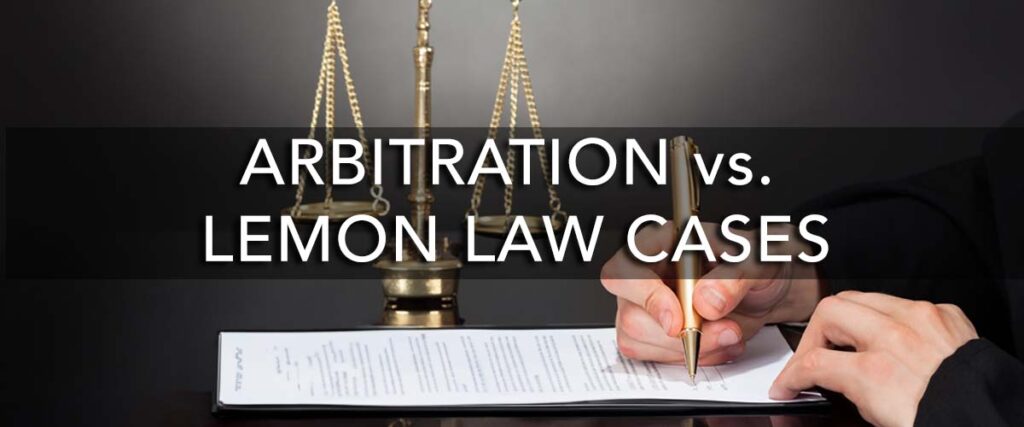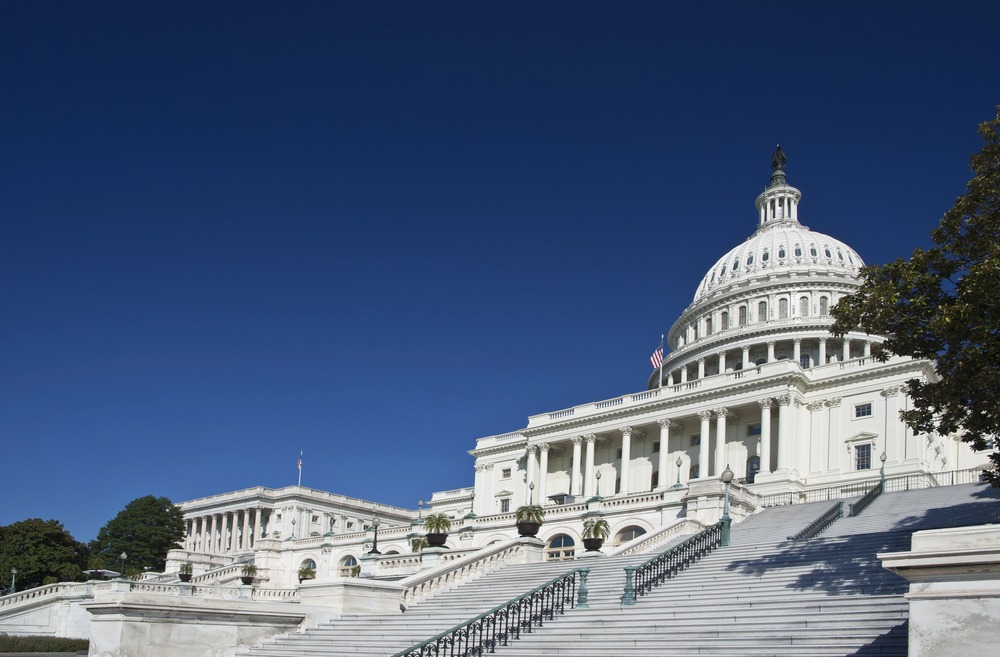
The Majority of Consumers Lose at Arbitration
The California Lemon Law does not require the consumer to participate in arbitration that may be offered by the vehicle manufacturer in order to pursue a Lemon Law claim.
Dealerships typically ask consumers to agree to arbitration in a stand-alone agreement or as part of the retail installment sales contract signed in the F&I (Finance and Insurance) office. The arbitration clause is usually buried somewhere on the backside of the contract, interspersed amongst other legal jargon written by attorneys, for attorneys, that consumers never really read.
IF the clause is “explained” to you it’s usually along the lines of a somewhat mumbled and glossed over “all dealerships have this standard clause on their documents” as you’re quickly moved along to the next “initial here.” In fact, most dealers will not deliver a vehicle without the signed arbitration clause, and some manufacturers will not provide financing to any dealerships that do not have the clause in their sales contracts.
Arbitration provisions in consumer contracts are not voluntary, especially when an entire industry has adopted them.

Auto dealers are independent from the manufacturers so you should also check your warranty book for their clause. This pre-litigation requirement is included in most manufacturers’ warranty manuals.
The manufacturer’s warranty probably requires you to participate in a non-binding “informal dispute settlement procedure” through either the BBB’s Auto Line® program or another provider called the Dispute Settlement Board. This is non-binding in the sense that if you don’t like the outcome, you can pursue the warranty claim in court.
Arbitration and Mediation are not the same thing.
Arbitration is when the parties involved bring their case to an arbitrator who reviews the complaint and makes a decision. With mediation, a non-binding process, the final decision is reached between the two conflicting parties; the mediator does not decide the outcome.
Arbitrated decisions are binding on the manufacturer, once accepted by the consumer. If the consumer wins, the manufacturer has to accept and abide by the arbitrator’s decision, which is most likely going to be in favor of the manufacturer and/or dealership because they are paying the arbitrator’s fees.
If the consumer loses (and a majority of consumers lose), or if the consumer is dissatisfied with the remedy awarded to them, the lemon law allows the consumer to file a lawsuit.
If your vehicle was manufactured by one of the manufacturers listed below, you may be required to go through arbitration before you can file a lawsuit under the California Lemon Law.
BBB Arbitration vs. Lemon Lawsuit
The California Lemon Law does not require the consumer to participate in arbitration that may be offered by the vehicle manufacturer in order to pursue a Lemon Law claim. Furthermore, the consumer is not bound by the decision of the arbitrator(s), unless the consumer agrees to be bound. However, many manufacturers have agreed to be bound by the arbitration decision. Automobile manufacturers may describe the arbitration process as follows:
Our dispute resolution program can help you resolve your lemon law complaint, and you don’t even have to hire a lawyer. Our lemon law complaint program covers car warranty issues against participating manufacturers.
BBB Auto Line does not charge a fee to consumers. To protect impartiality, funding for staff and program administrative costs of BBB AUTO LINE are committed in advance by the participating manufacturers. — From the BBB website.
On the surface, it would seem like going through the BBB dispute resolution program is a good idea. As it turns out, not so much.
Unfortunately for the consumer, there is a downside to arbitration: The consumer could end up receiving LESS than the California Lemon Law allows for! This is just one way in which arbitration favors the automobile manufacturers. Another advantage for automobile manufacturers is that an arbitrator is not required to apply the law the way a court would. And, for the icing on the cake — the consumer could be stuck in arbitration for years.
Vehicle manufacturers and the BBB have determined the rules of this patently unfair system. Even if the consumer does win, the consumer could end up with a fraction of what they are entitled to under the law. The rules serve the automobile manufacturers and dealers far more than they serve the consumer.
Arbitrators are biased in favor of the businesses that pay for the arbitration. If arbitration didn’t benefit the automobile manufacturers, why would they pay the BBB in advance for participating in the program?
BBB CASE IN POINT
In an arbitration case involving the BBB Auto Line program, the arbitrator denied the consumer a buyback request, even though the arbitrator agreed that the vehicle’s defects did substantially impair the use, value, or safety of the vehicle. The rationale for the denial was the dealership mistakenly believed that the transmission and suspension system defects [in the Ford Focus] are ‘normal’ operating conditions.
Click here to read the BBB decision (PDF). (Confidential information has been redacted from this document.)
Some Automobile Manufacturers are Worse Than Others in Regards to Arbitration
As an example, Ford’s rules make it harder to establish liability under the BBB Auto Line® program because the defect has to show up within 18 months or 18,000 miles from the warranty start date (which may not be the same as the date you purchased the vehicle). The Ford factory warranty start date begins on the date the vehicle is delivered to the first retail buyer or put into use, whichever occurs first.
What if you were purchasing a dealer demo and the vehicle was “put into use” a few months before you purchased it? It is entirely possible for your warranty to have started before you bought the vehicle which would mean that you would receive less warranty coverage than you are supposed to.
Arbitrators rule in favor of businesses and against consumers more than 90% of the time. The rules of discovery (the process by which consumers prove their cases using evidence) are limited in arbitrations and this makes arbitration hearings and the whole arbitration process more favorable for automobile manufacturers instead of consumers.
Future Hope for Consumers? It Depends.
Dealerships could soon be barred from using an arbitration agreement.
As a result of the Dodd-Frank Wall Street Reform and Consumer Protection Act (better known and most often referred to as “Dodd-Frank”) that was signed into law in 2010, a new regulatory agency called the Consumer Financial Protection Bureau was created. Congress required this new regulatory body to do a study into how arbitration clauses affect consumers and financial services companies. The Dodd-Frank Act gave the Consumer Financial Protection Bureau the power to make regulations that would protect consumers.

The Dodd-Frank Act could force the widespread use of arbitration agreements in ALL consumer and employment contracts to come to an end. Ending the use of arbitration agreements would mean that automobile dealerships and consumers would be on a level playing field in a court of law.
As you may already suspect, automobile dealers, automobile manufacturers and their lobbyists have far more pull in Congress than “We the People.”
Mandatory arbitration clauses are so insidious that even the car dealers are against them — but only if removing them is to THEIR benefit. The National Automobile Dealers Association (NADA) wrote to members of Congress in 2000 saying that if arbitration clauses weren’t outlawed for the dealerships, mandatory binding arbitration clauses would be able to unilaterally deny small business automobile and truck dealers rights under state laws that are designed to bring equity to the relationship between automobile manufacturers and dealers. Congress agreed and passed legislation protecting the dealers. Apparently, though, car dealers did not (and still do not) see a problem in using an arbitration clause with their own customers. (See: Senate Hearing 106-1066, Serial No. J-106-68)
For dealers, the end of arbitration would mean they would no longer have what they claim is a way to speed up dispute resolution, cut costs (for them; not for the consumer), help keep them out of court and minimize the risk of class-action lawsuits. If auto dealers are so concerned about potential class-action lawsuits, wouldn’t it stand to reason that if they took care of their customers — the very people who keep them in business — the way they want the automobile manufacturers to take care of them, then lawsuits would be a non-issue?
Arbitration agreements are used in the majority of contracts. Not only in vehicle purchases, but also with any purchase a consumer makes involving a retail installment sales contract. Everything from cell phone contracts, to the appliances, to whatever a consumer purchases that involves signing a contract.
UPDATE AUGUST 4, 2015 — California Supreme Court Upholds Validity of Standard Auto Sale Arbitration Clause
UPDATE MARCH 17, 2022 – U.S. House of Representatives Passes Bill to End Mandatory Arbitration of Legal Disputes
PARTICIPATING MANUFACTURERS IN A STATE-CERTIFED ARBITRATION PROGRAM – FOR THE STATE OF CALIFORNIA
Related articles:
- Effective January 1, 2015, AB 802 requires large-scale arbitration providers such as JAMS and AAA to collect and publish certain details about consumer arbitration proceedings that were previously confidential. Arbitration providers must publish the required information in a consumer-friendly format, accessible from a conspicuous link on the arbitration providers’ website.
- The nonprofit consumer group Public Citizen analyzed data the NAF (an arbitration firm) provided to the state of California, one of the few states that actually requires arbitration firms to disclose information about their results. Public Citizen found that in 94 percent of 19,000 cases, NAF arbitrators ruled in favor of the businesses that hired them.
Know your rights and the remedies to which you are entitled.
The inherent problems with the BBB arbitration rules show that a consumer should be careful going into a BBB arbitration without at least speaking to a Lemon Law attorney first.
Lemon Laws, Warranty Laws and Arbitration are very complex topics and impossible to describe comprehensively in a blog post. It would be in your best interest go give us a call to find out whether or not you have a lemon law case and whether or not you are required to go through arbitration before you file a lawsuit. It will be during our consultation that we will be able to offer the best course of action for you to take.
Call us at 855-595-3666
California Residents ONLY.
Year restrictions apply: Model years 2021 – 2025 Only


